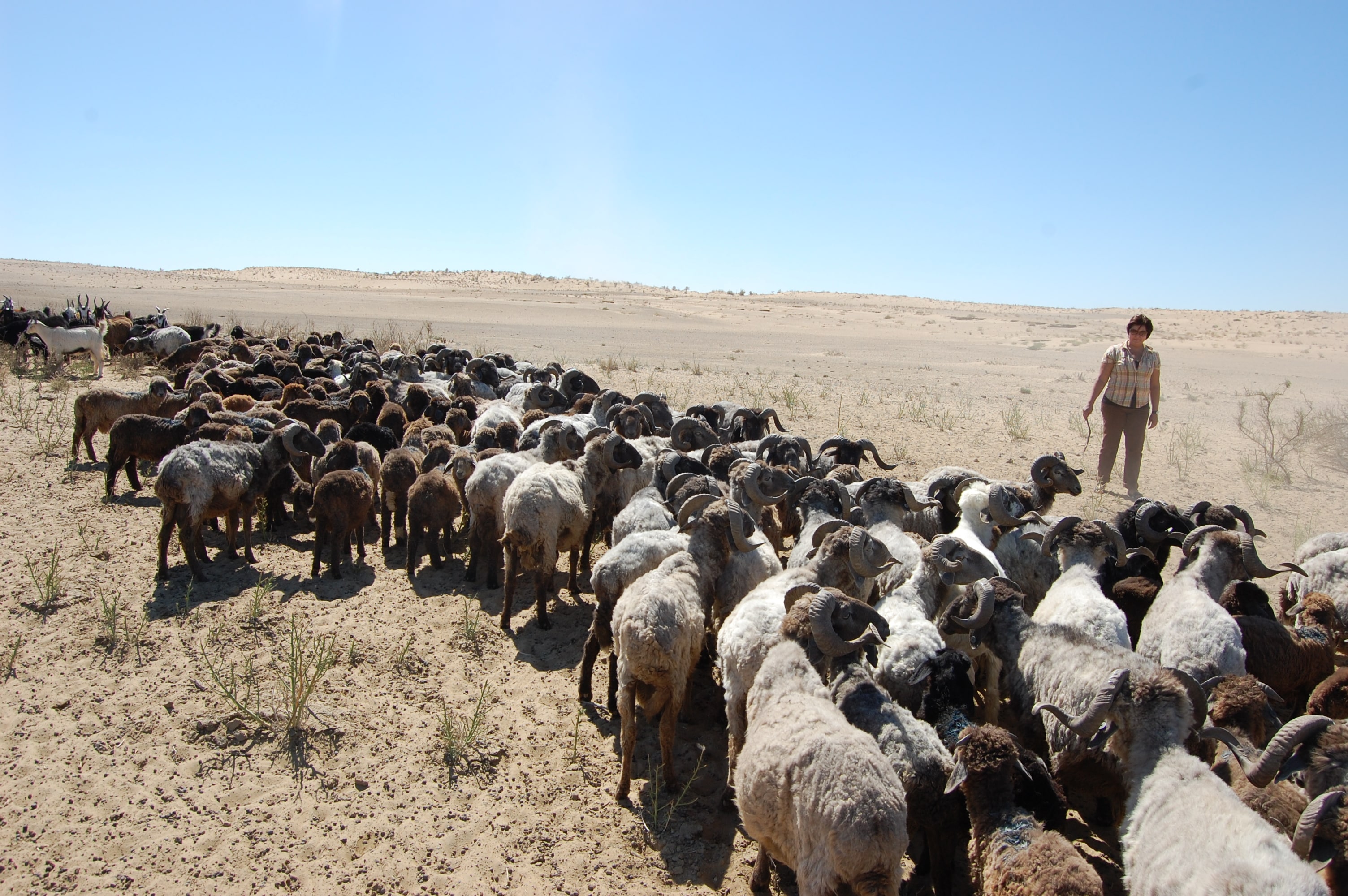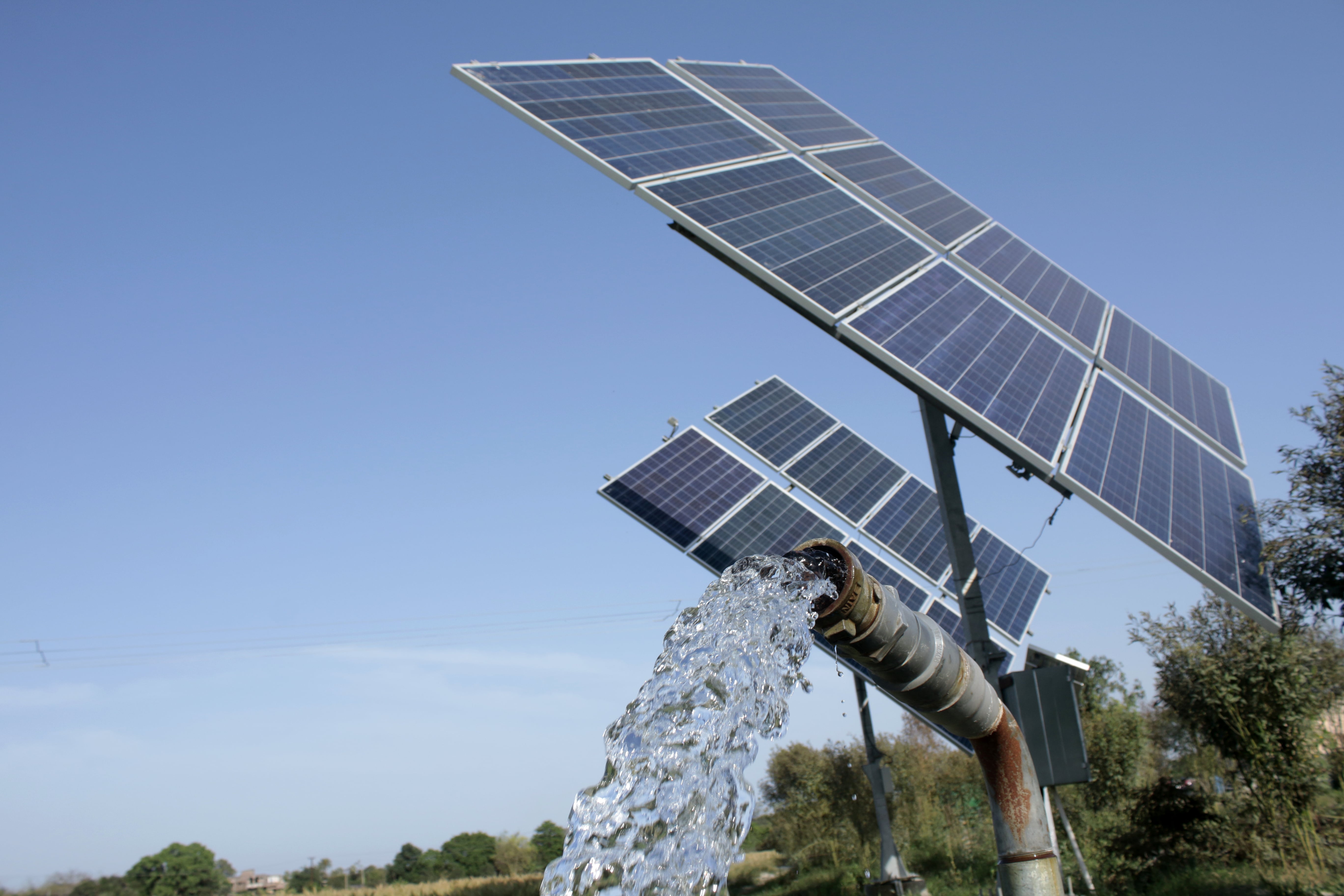
Uzbekistan: roadmap to tackle climate change challenges to agricultural production
Livestock in a desert region of Uzbekistan. A focus of the project is on assessing biogas production potential from livestock residues. © UNDP
19/10/2023
Agriculture is crucially important to Uzbekistan, contributing 28 percent to national GDP and providing employment for about a quarter of the population. Large-scale farming of wheat, the main staple of Uzbekistan, and smaller-scale farming of fruit and vegetables, along with livestock rearing, represent the three major value chains of the country. However, current agricultural production is under threat due to the forces unleashed by climate change and the accompanying issues of environmental degradation. This has meant that previous trends in increased production and rising incomes are no longer guaranteed, and in many instances are being reversed.
The two major obstacles to sustainable agricultural production in Uzbekistan are decreasing availability of water and declining soil fertility. This is confounded by weaknesses in the energy sector. Although rich in natural resources for energy generation, outdated infrastructure results in unreliable energy supply, particularly in rural areas that rely on electricity to operate irrigation systems, which are often outdated.
The background
This work was part of “Food Systems, Land Use and Restoration Impact Program in Uzbekistan”, a Global Environment Facility project under the Food System, Land Use, and Restoration (FOLUR) Impact Programme requested by the Ministry of Agriculture and the State Committee of the Republic of Uzbekistan for Ecology & Environmental Protection. It was supported by technical assistance from the Food and Agriculture Organization of the United Nations (FAO).


Left/Top: Uzbekistan. Winter wheat varieties in Kashkadarya. © MEL/Sanobar Khudaybergenova (CC BY-SA). Right/Bottom: A PV-powered irrigation pump. The feasibility of using such pumps along the wheat and alfalfa chains was assessed. This pump is in India. © Ayush Manik
Renewable energy interventions
The FAO Energy Team identified three major wheat growing regions in Uzbekistan, Karakalpakstan, Kashkadarya and Khorezm, that merited interventions according to levels of land degradation. A baseline study assessed energy technologies and potential interventions that could positively impact wheat, dairy, horticulture and alfalfa value chains. It also gauged the capacity to scale up any interventions made in terms of establishing renewable energy production technologies.
The most pressing problems
Serious issues that needed to be addressed included, excessive reliance on fossil fuels that contribute directly to climate change, in addition to outdated, inefficient energy production. Access to reliable and affordable energy was also suboptimal, severely restricting agricultural productivity and income generation. Additionally, cold storage facilities were often inadequate, resulting in loss of product and deterioration in product quality, which translate into marketability problems. These production problems were exacerbated by limitations in irrigation capacity because of widespread use of old energy-demanding water pumps.
Solutions to the problems
The study identified several options to improve production capacity of farmers in the three regions through implementing technologies for renewable energy production:
- Solar Photovoltaic (PV) Systems to power irrigation pumps, mills and cold storage facilities.
- Utilization of wind power plants to generate electricity.
- Production of energy from biomass, including use of agricultural residues and waste to produce solid biofuels and biogas.
The options were refined into a series of technological solutions tailored to each of the value chains. These relied on electricity generated through PV to pump irrigation water, power cooling units and run processing mills and drying facilities. In the dairy and the horticulture value chains, the green energy was used for pasteurizing and packaging milk, and processing tomatoes.
Calculations were made for each process regarding the potential for scaling up and for contributions to climate change mitigation.
Potential impacts of renewable energy interventions
It was established that increased adoption of renewable energy technologies would reduce greenhouse gas emissions, promote a more sustainable agriculture sector and contribute to mitigating global climate change. Simultaneously, this would reduce levels of poverty through modernization of agrifood chains, fostering local entrepreneurship and creating job opportunities in line with Uzbekistan's poverty reduction goals. Through improvement of irrigation infrastructure, making energy supply more reliable and affordable, crop production would be increased and improvements would result from better storage facilities for perishable products.

A square baler - one of the interventions assessed was use of PV-powered balers to produce dehydrated alfalfa bales. © Ben Franske
The challenges ahead
Successful implementation of the suggested interventions will rely on increasing awareness about renewable energy technologies among the proposed beneficiaries. Currently, many farmers are unlikely to be familiar with advanced technologies and could be hesitant in adopting them. Limited access to the renewable energy technologies represents another potential stumbling block. Even if these two barriers can be surmounted, there remain issues of finance, specifically obtaining loans from local financial institutions.
In order to reduce the risk of low adoption levels, and to support renewable energy market development in Uzbekistan, specific measures are foreseen as part of the project implementation.
- Detailed stakeholder mapping to initiate awareness raising, education and engagement of stakeholders for market development (farmers, entrepreneurs and service providers, financial institutions, and local, regional and national authorities).
- Design and establishment of a financial facility and technical assistance facility that will support the uptake of new technologies during the infancy of market development.
- Technical assistance to help define a favourable regulatory framework that will support innovations during the initial period and promote upscaling and secure a stable regulatory environment that promotes further development of the market though to its maturity.
Looking to the future
Renewable energy technology can help mitigate climate change, reduce fossil fuel dependency and lower energy costs. However, such advanced technologies require substantial investments, which can make them unaffordable. Managing renewable energy technology can also be problematic and there is need for skilled workers and technicians to install, operate and maintain renewable energy systems. However, Uzbekistan is making progress in overcoming these bottlenecks and is set to harness its abundant renewable energy resources and achieve sustainable development of its most important agricultural products.
